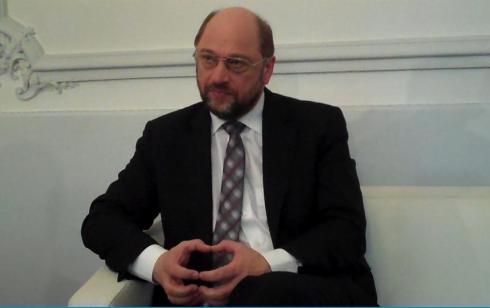The euro may yet be saved, Martin Schulz believes: at best, if Europe’s leaders can change their spots – give up their ex officio wheeling and dealing – and let their institutions act.
In an interview with Presseurop the President of the European Parliament, in office since the start of this year, sounds just like the boss of a rival government that he wants to build: the Parliament versus the Council and the Commission. Changes at the next European elections should help bring Parliament more to the fore in the minds of voters.
We meet the President of the EU Parliament in the Parliament’s Paris office, near the National Assembly and the Seine. The former bookseller, notorious in the plenary hall for volleys of loud insults (“The financial markets drive a Ferrari, and the governments of Europe plod behind them on a bicycle”), now sits quite calmly on the white sofa of the meeting room and is giving interviews by the dozen.
Mr. Schulz, the euro crisis has entered its third summer. Can the currency still be saved?
I think the euro can be saved. This depends a little on the willingness of the parties involved to finally arrive at sustainable and lasting management in the eurozone. Such events like those at the last summit – when agreement is reached in a meeting at night and the next day two governments say, “We didn’t really mean it like that” – do immense damage. We have a strong economy. We have a strong economic zone with a strong currency, 17 governments. It can’t move forward like this over the long run.
The euro crisis so far has brought twenty-five crisis summits, “historic decisions” that have not made history and that have made the citizens angry at Europe’s governments, which clearly continue to restrict themselves to a tenacious “business as usual”. What can you say to Europe’s citizens to keep them from losing the faith?
I’ll try to address myself to European citizens, and with a positive message. Namely that, if we want to, we are very strong when we act together. That if we do not want to act in concert and to break down into our constituent parts, with Germany as the largest country and Malta the smallest, we’ll be at the mercy of the interests of other parts of the world.
Europeans are very fond of talking about “rising states” such as Brazil, South Africa, India, China ... I’ll give the Europeans some good advice: don’t start talking about “descending nations”. If we want to prevent this, we need a strong and united Europe.
The problem is not the institutions, but the unwillingness of the government leaders, both of the eurozone and of the 27 member states as a whole, to reach agreement. This is because of a strong ideological confrontation in the Council between a way of thinking, which Germany strongly represents – and so too do the Netherlands, Finland and other countries (“We won’t pay for the others”) – and the attitude that only a general pooling of debt can resolve the problems (which, on the other hand, they exaggerate)...
If we do not build a bridge between the two and finally find a workable compromise, then we are moving towards the dark ages. I would like to tell that to the voters.
Do you want to expand the EU Parliament into an institution that defies the Council of the government leaders. What would be better in Europe if the Parliament were in the driving seat?
We act with clear majorities. Three examples: two years ago, the Parliament called for and presented an investment pact. One percent of the gross domestic product of the eurozone. Rejected. Last year, the European Parliament, with a bigger majority than I had ever seen, voted across party lines, 570 votes, for the financial transaction tax. Rejected. Two years ago the European Parliament called, with an overwhelming majority, for a banking union. Rejected.
Now, two years on, after a reaction-time of 24 months, the European Council has adopted the banking union, the financial transactions tax and a one percent growth pact, and claimed that as a great achievement. These are all things that the EU Parliament presented long ago and that the heads of government, in all their arrogance, rejected. We have wasted two years on it.
So the European Parliament does act, but regrettably, the heads of government do not.
It’s just that no one hears that, as can be seen every five years in the record abstention rates for European Union elections. Tell us your recipe to make going to the EU polls something more than merely a reaction by voters to their national governments.
I think that in the next European elections, for the first time, there will be candidates who campaign across Europe for their political orientation. That is, a candidate for the Socialists, Conservatives, Liberal Democrats, the Greens and so on – for the Office of the President of the Commission. Why? The Lisbon Treaty stipulates that the President of the Commission, that is the supreme executive of the Union, almost a head of government, be selected by Parliament. The Council must propose a candidate, “taking into account” – as stated in the Treaty – “the outcome of the elections”, i.e., the candidate who can unite a parliamentary majority behind him.
This leads to an electoral battle between political agendas and human minds. And then it’s no longer about the national governments, but whether the Left or the Right will rule Europe.
Was this article useful? If so we are delighted!
It is freely available because we believe that the right to free and independent information is essential for democracy. But this right is not guaranteed forever, and independence comes at a cost. We need your support in order to continue publishing independent, multilingual news for all Europeans.
Discover our subscription offers and their exclusive benefits and become a member of our community now!












